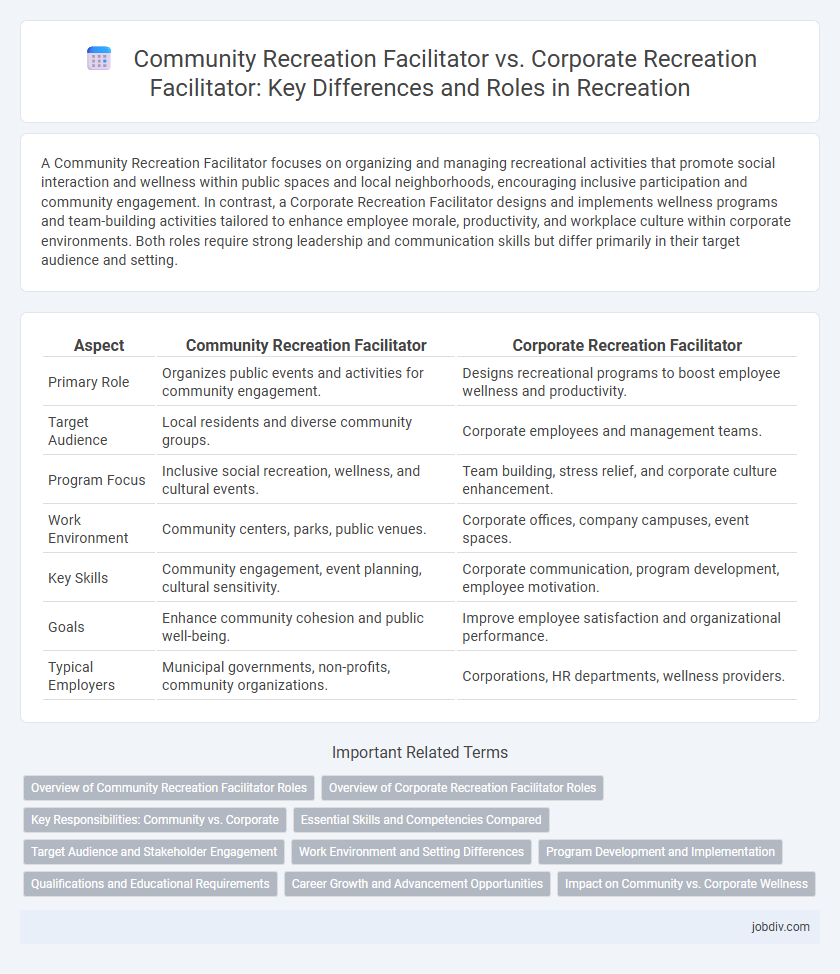A Community Recreation Facilitator focuses on organizing and managing recreational activities that promote social interaction and wellness within public spaces and local neighborhoods, encouraging inclusive participation and community engagement. In contrast, a Corporate Recreation Facilitator designs and implements wellness programs and team-building activities tailored to enhance employee morale, productivity, and workplace culture within corporate environments. Both roles require strong leadership and communication skills but differ primarily in their target audience and setting.
Table of Comparison
| Aspect | Community Recreation Facilitator | Corporate Recreation Facilitator |
|---|---|---|
| Primary Role | Organizes public events and activities for community engagement. | Designs recreational programs to boost employee wellness and productivity. |
| Target Audience | Local residents and diverse community groups. | Corporate employees and management teams. |
| Program Focus | Inclusive social recreation, wellness, and cultural events. | Team building, stress relief, and corporate culture enhancement. |
| Work Environment | Community centers, parks, public venues. | Corporate offices, company campuses, event spaces. |
| Key Skills | Community engagement, event planning, cultural sensitivity. | Corporate communication, program development, employee motivation. |
| Goals | Enhance community cohesion and public well-being. | Improve employee satisfaction and organizational performance. |
| Typical Employers | Municipal governments, non-profits, community organizations. | Corporations, HR departments, wellness providers. |
Overview of Community Recreation Facilitator Roles
Community Recreation Facilitators organize and support local recreational programs designed to enhance social well-being and foster community engagement. They collaborate with diverse groups to plan inclusive activities, manage resources, and promote health and fitness within neighborhoods. These professionals prioritize accessibility and cultural relevance to strengthen community ties through recreation.
Overview of Corporate Recreation Facilitator Roles
Corporate Recreation Facilitators design and implement wellness programs that promote employee engagement, improve workplace morale, and enhance productivity within corporate settings. They coordinate team-building activities, stress management workshops, and fitness initiatives aligned with organizational goals and company culture. Their expertise blends recreation management with business strategies to foster a healthier, more cohesive workforce.
Key Responsibilities: Community vs. Corporate
Community Recreation Facilitators organize inclusive programs that promote social engagement, health, and wellness within neighborhoods, managing public resources and coordinating volunteer involvement. Corporate Recreation Facilitators develop tailored wellness initiatives and team-building activities aimed at improving employee morale, productivity, and workplace culture, often integrating corporate goals and budgets. Both roles require strong communication and organizational skills but differ in target audiences, strategic objectives, and resource management.
Essential Skills and Competencies Compared
Community Recreation Facilitators excel in communication, cultural sensitivity, and conflict resolution to engage diverse populations and foster inclusivity in public programs. Corporate Recreation Facilitators prioritize project management, strategic planning, and employee wellness expertise to design activities that enhance productivity and organizational culture. Both roles require adaptability and leadership, but the community focus emphasizes social interaction, while the corporate focus targets business objectives and team cohesion.
Target Audience and Stakeholder Engagement
Community Recreation Facilitators primarily target local residents and diverse demographic groups, fostering inclusive programs that promote social cohesion and well-being within neighborhoods. Corporate Recreation Facilitators focus on employees and organizational teams, designing activities that enhance workplace morale, team-building, and productivity. Stakeholder engagement for community facilitators involves collaboration with local government, nonprofits, and community members, while corporate facilitators engage HR departments, management, and employee committees.
Work Environment and Setting Differences
Community Recreation Facilitators typically work in public parks, community centers, and local nonprofit organizations, focusing on inclusive programs that engage diverse populations. Corporate Recreation Facilitators operate within private companies or corporate wellness programs, tailoring activities to improve employee well-being and productivity in office or workplace environments. The work environment for community facilitators often involves outdoor and varied social settings, while corporate facilitators primarily work indoors, aligning activities with organizational goals and employee schedules.
Program Development and Implementation
Community Recreation Facilitators design and implement programs tailored to diverse populations, emphasizing accessibility, inclusivity, and local engagement to foster social cohesion and promote active lifestyles. Corporate Recreation Facilitators develop and manage wellness and team-building initiatives targeted at employees, aiming to enhance workplace morale, productivity, and employee well-being through structured recreational activities. Both roles require strategic planning, resource coordination, and evaluation to ensure program effectiveness and participant satisfaction within their specific contexts.
Qualifications and Educational Requirements
Community Recreation Facilitators typically require a background in social work, recreation management, or community development, often holding certifications such as CPRP (Certified Park and Recreation Professional). Corporate Recreation Facilitators usually possess qualifications in business administration, human resources, or organizational psychology, supplemented by specialized training in wellness programs and employee engagement strategies. Both roles benefit from strong communication skills and experience in program planning, but community roles emphasize public service, whereas corporate positions focus on enhancing workplace morale and productivity.
Career Growth and Advancement Opportunities
Community Recreation Facilitators often experience career growth through expanding public program development and securing funding for local initiatives, enhancing their leadership in diverse community settings. Corporate Recreation Facilitators advance by designing wellness programs that improve employee engagement and productivity, positioning themselves as key contributors to organizational culture and human resources strategy. Both roles offer distinct pathways, with community facilitators focusing on public impact and corporate facilitators emphasizing business-driven recreation outcomes.
Impact on Community vs. Corporate Wellness
Community Recreation Facilitators design programs that enhance social cohesion, promote physical activity, and improve overall public health by addressing diverse community needs. Corporate Recreation Facilitators focus on employee wellness, reducing workplace stress, and boosting productivity through tailored recreational activities and team-building events. Both roles contribute significantly to wellbeing, with community facilitators impacting public health at a population level while corporate facilitators target organizational health and employee engagement.
Community Recreation Facilitator vs Corporate Recreation Facilitator Infographic

 jobdiv.com
jobdiv.com